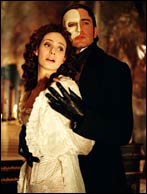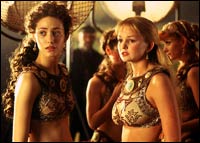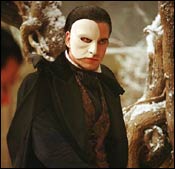 | « Back to article | Print this article |
 It may not be as incisive, witty and moving as the hit Oscar-winning musical Chicago, but The Phantom Of The Opera is anything but boring.
It may not be as incisive, witty and moving as the hit Oscar-winning musical Chicago, but The Phantom Of The Opera is anything but boring.
There are enough spectacles, sumptuous production values and lovely music by Andrew Lloyd Webber to give anyone plenty of pleasure and escapist entertainment.
Both Chicago and The Phantom are based on hugely successful stage musicals but the latter's worldwide success is unparalleled. In about 18 years, over 85 million tickets have been sold worldwide, resulting in a $3.2 billion gross. In addition, over $600 million comes from the sale of over 40 million albums -- and now with the release of the film, the music has become a hot seller all over Britain and America.
The Phantom Of The Opera, which has been produced in more than 20 countries in North America, the Pacific region, Europe and Asia, is the largest grossing stage or movie production. The Titanic, for instance, grossed about $1.8 billion in movie theatres worldwide.
But the movie version of The Phantom, directed by Joel Schumacher -- which is expanding this week from 900 to some 1,500 theatres in North America -- looks headed for an average run.
The film opened in a handful of screens during Christmas week, and went on into several expansions over the next 15 days. The latest expansion could be its last. It could also push the film up a couple of notches from its 9th position on the box-office charts.
![]()
More on rediff.com !
![]()
![]()
![]()
![]()
'My films tend to be dark'![]()
Quiz: Know your Kisna?![]()
Meet Subhash Ghai's new heroine!![]()
![]()
![]()
The film -- which at one point was to be directed by Shekhar Kapur when he worked on Bombay Dreams with Webber -- cost about $70 million, and is ending its British run with about $20 million, a solid gross.
But it has bombed elsewhere across Europe. In America, box-office experts expect it, in the absence of major Oscar nominations, to end its run with a so-so $50 million gross. During the last four weeks, it has grossed about $28 million. Worldwide, the projected gross for the movie is $120 million, less than half of the Chicago gross.
Many major reviewers haven't been kind to the movie, calling it an exercise in excessive melodrama.
'Butler, Wilson, and Rossum don't have the charisma to stop this thing from steamrolling over them,' wrote The Boston Globe. 'But they'd make wonderful displays in a wax museum Dishwater has more razzle-dazzle.'
 In Chicago Sun-Times, Roger Ebert was kinder. 'This is such a fabulous production that by recasting two of the three leads and adding some better songs it could have been, well, great.'
In Chicago Sun-Times, Roger Ebert was kinder. 'This is such a fabulous production that by recasting two of the three leads and adding some better songs it could have been, well, great.'
Though The Phantom was nominated for three Golden Globes, it picked up no awards.
In its opening year in New York, the stage musical directed by Hal Prince psyched seven Tony Awards, including one for Best Musical.
The arrival of the movie hasn't hurt the Broadway show; it seems to have led to a revived interest in the staged production.
Now in its 17th year in New York, The Phantom Of The Opera is at the 1,600-seat Majestic Theatre where it has been performed over 7,000 times. Even during the weak winter months, it draws a decent number of audiences who pay an average $53 per ticket.
Last week, it went about 90 percent full, and many Broadway experts believe the arrival of the film is nudging people to see the 'real thing' live. The thrill of seeing a huge chandelier rise in the middle of the theatre and crash on the stage, and many similar dramatic scenes, are more hair-raising to audiences than in the film. They are prepared to pay five times the movie ticket price to see the live show.
Rossum, who had a fleeting but important role in Clint Eastwood's Mystic River, is the innocent chorus girl Christine Daae, thrust into the limelight when the temperamental diva (Minnie Driver) quits a show half-way through a dress rehearsal.
Christine owes a lot to her 'Angel of Music,' the voice calling to her from the shadows. She is convinced the mysterious benefactor is the angel her dying father had promised to send her. But we soon know that the 'angel' is actually the Phantom (Gerald Butler), a disfigured, bitter, ambitious but tragic musical genius who haunts the catacombs of the opera house. Despite his possessiveness and jealousy, the Phantom is still a heart-breaking character, and the writer of the novel Gaston Leroux had said at its publication in 1911 that he had been inspired by Victor Hugo's hunchback.
Much of Leroux's novel unfolds in the year 1870.
The Phantom is not the only man mesmerised by Christine. A wealthy patron (Patrick Wilson) is also dying to promote her, and make her his own. The stage is now set for the unfolding of more passion, jealousy and rivalry, leading to spectacular tragedy.
Webber served as the composer and scriptwriter on The Phantom Of The Opera. In the production notes, he says it was clear to him the movie version would differ from the stage show, and he welcomed the challenge of recreating the show for the big screen.
For instance, in the stage musical, the massive chandelier crashed right before the intermission but in the film, it comes down only toward the end. Naturally, the movie climax ends differently.
The role of Raoul, the young benefactor who falls in love with Christine, has also been expanded for the movie version, giving acclaimed stage actor Patrick Wilson (Oklahoma! and The Full Monty) a good stab at a film career. Another part from the musical that has been expanded for the screen is that of Madame Giry, the ballet mistress (Miranda Richardson). Her character is quite complex: She knows more about the mysterious events at the opera house and the Phantom than she wants to reveal.
 On stage, Christine is often an older person, but director Schumacher wanted a younger actress. Rossum was 17 when the filming took place. Schumacher, known for such films with varied themes as Batman Forever and A Time To Kill, has said that he saw the musical as a 'sexy young woman's story.'
On stage, Christine is often an older person, but director Schumacher wanted a younger actress. Rossum was 17 when the filming took place. Schumacher, known for such films with varied themes as Batman Forever and A Time To Kill, has said that he saw the musical as a 'sexy young woman's story.'
He has also said that the movie gives the character of the Phantom more depth and his plight because it takes the viewers into his childhood.
And Lloyd Webber agrees with Schumacher. Though the film does not deviate too much from the stage material, he says, it has acquired 'an even deeper emotional character.'